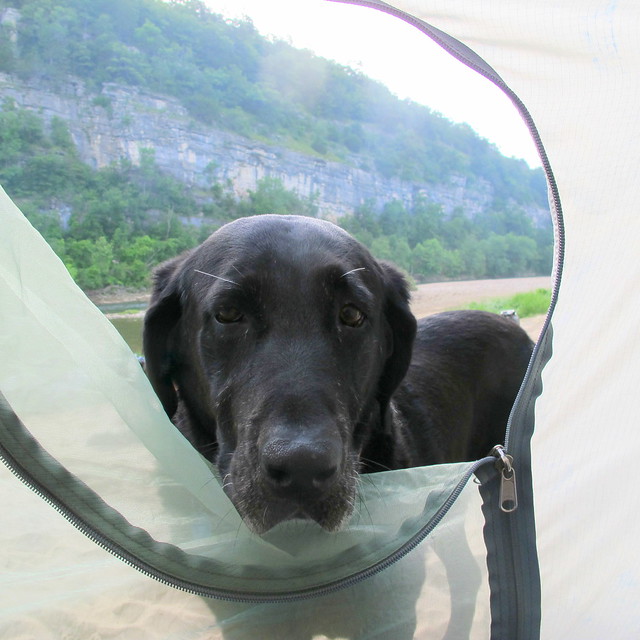 |
| Photo by OakleyOriginals |
While there are numerous issues to consider while camping with dogs, these are some of the most important.
1. Make Sure that Your Dog Can’t Get Lost
It’s one thing if your dog gets free in your neighborhood. It’s another when you’re at a rest stop, nine hundred miles from home. Either train your dog to come when called or make absolutely sure that they’re on a leash at all times.
2. Get All of their Vaccinations Up to Date
If your dog gets into an altercation with another animal (or a person), the central issue will become their rabies shots. If you stay at a campground that has a demanding pet policy, you’ll need to verify your dog’s vaccination records. If you cross into Canada, you’ll have to confirm that your dogs have had their shots. You get the idea.
3. Make Your Dogs Easy to Identify
If your dog does get lost (unfortunately, it happens all the time), the ability to easily identify them will become critical. For permanent identification purposes, consider tattoos or microchips. At a minimum, make sure they wear tags that show their name, your current phone number, and the date of their last rabies vaccination.
4. Clean Up After Your Dog
The biggest complaint about dogs has nothing to do with their bark, their bite, or their behavior. If you pick up after your dog, you’ll be helping dog owners everywhere.
5. Learn How to Provide First Aid to Your Dog
If a medical crisis occurs while at home, you drive to your local veterinarian. But if you’re heading down a dark highway in a strange town, it will seem like a bad dream. Although there are ways to get help while on the road, it always takes more time. In the meantime, your ability to provide competent first aid could save your dog’s life.
6. Involve Your Dog in Everything You Do
If you really want your dogs to have a good time, include them in your activities. Take them with you on long walks. Buy a cheap plastic wading pool and let them play in the water. Throw a ball. Cook them up a hamburger. If you do stuff like that, they’ll do cartwheels the next time you decide to take them camping.
7. Call the Campgrounds Before You Go
Even if a park claims they’re pet–friendly, always call ahead to confirm their policy regarding your dogs. We’ve arrived at parks (with our two German Shepard dogs) after a long day on the road only to discover that “pet–friendly” meant dogs weighing under 20 pounds.
8. Plan Ahead for the Unexpected
Have a plan (for your dogs) in case of a flat tire, a serious accident, or a fire in your RV. Start with a few extra leashes, a pet carrier, and an extra fire extinguisher. Then have a fire drill to identify potential problems.
9. Learn About Your Camping Environment
The U.S. is a huge country with a vast assortment of dangerous wildlife, treacherous plants, unpredictable weather conditions, and demanding environmental challenges. If you don’t know what you’re doing, you might inadvertently be putting yourself and your dog in danger.
10. Recognize and Respect the Views of Others
While some of us can’t imagine traveling without dogs, others can’t image traveling with them. If you keep your dog under control and clean up after them, you won’t give others much to grumble about.
Happy Camping with Rover!

No comments:
Post a Comment